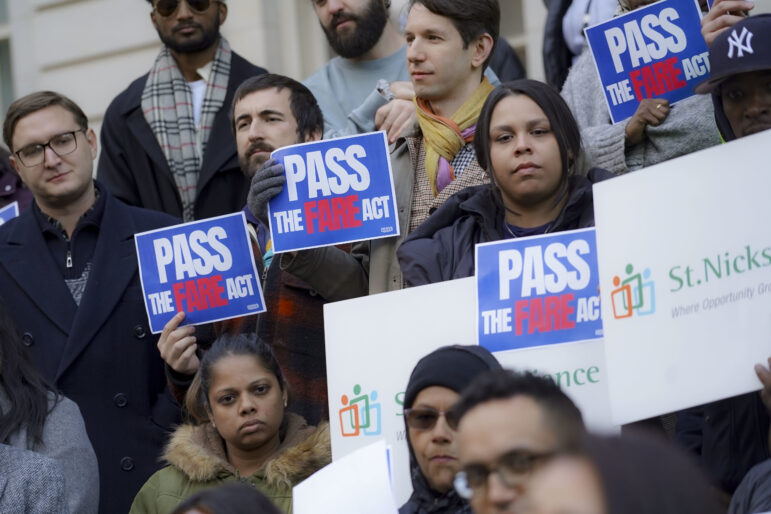“There is still much more work to be done to address our housing crisis. But the FARE Act is one significant step. It’s also a great example of what we can accomplish when tenants come together and advocate for policies that will make our lives easier.”
Gerardo Romo / NYC Council Media Unit
A rally at City Hall in support of the FARE Act in November 2024.
CityViews are readers’ opinions, not those of City Limits. Add your voice today!
Many across the country and around the world dream to live in New York. It’s what drew me here, long ago: the bright lights, the chance to meet people from around the world, and the chance to live out the line, “if you can make it here, you can make it anywhere.”
Once that dream becomes a reality, however, so many confront an obstacle that only tenants in two cities in America face: the need to pay thousands of dollars in broker fees to rent an apartment. Until now, only New York City and Boston forced applicants into such a dilemma.
Apartment hunting is already stressful. With skyrocketing rents and a 1.4 percent vacancy rate, finding a home in your price range seems doubtful. But then you finally find an apartment you can afford. When you sign a lease, you are typically required to submit your first and last months’ rent, plus a security deposit. You think the weight is finally off your shoulders until you are surprised with one last requirement: that broker’s fee. Tenants pay fees for a broker that they didn’t even hire.
Broker fees, which are often 15 percent to 20 percent of the apartment’s total annual rent, have caused prospective renters to back out at the last minute because they are unaffordable. Or they chose to go forward and get into more debt because their options are limited. It has not only been a burden for folks trying to move to New York, but it has especially impacted working-class and low-income New Yorkers and people of color.
With rents increasing, too many hard-working New Yorkers are being priced out of the communities they want to call home. And they are still unable to find an affordable place for them and their families to live because of broker fee costs.
Thankfully, the City Council recently passed Councilmember Chi Ossé’s legislation, the FARE Act. After it passed with a veto-proof majority in November, it automatically became law after Mayor Eric Adams let the bill sit on his desk for 30 days (as per city law). Once this new law takes effect in June, landlords who hire a broker will now be responsible for the broker fees, no longer the tenants.
Recently, the Real Estate Board of New York, representatives of the real estate lobby, sued to block the law from taking effect. They argue in filings that the law “infringes upon constitutional guarantees of free speech and contract rights” by banning broker listings without landlord consent. However, this isn’t their true motive. When the State of New York banned broker fees in 2020, REBNY sued then and won—and the fees returned.
Despite fierce opposition from the real estate industry, along with their expected lawsuit, the FARE Act is still popular amongst New Yorkers. The City Council was right to pass this legislation. Not only is it good for tenants, it’s common sense.
There is still much more work to be done to address our housing crisis. But the FARE Act is one significant step. It’s also a great example of what we can accomplish when tenants come together and advocate for policies that will make our lives easier. The FARE Act will have a great impact on our communities, and it will put us on a path to transform New York housing policy for the better.
Nick E. Smith is executive director of Communities Resist, a housing legal services and organizing group. He’s also the former New York City first deputy public advocate.
The post Opinion: The FARE Act is Not Just Good Policy. It’s Common Sense appeared first on City Limits.

